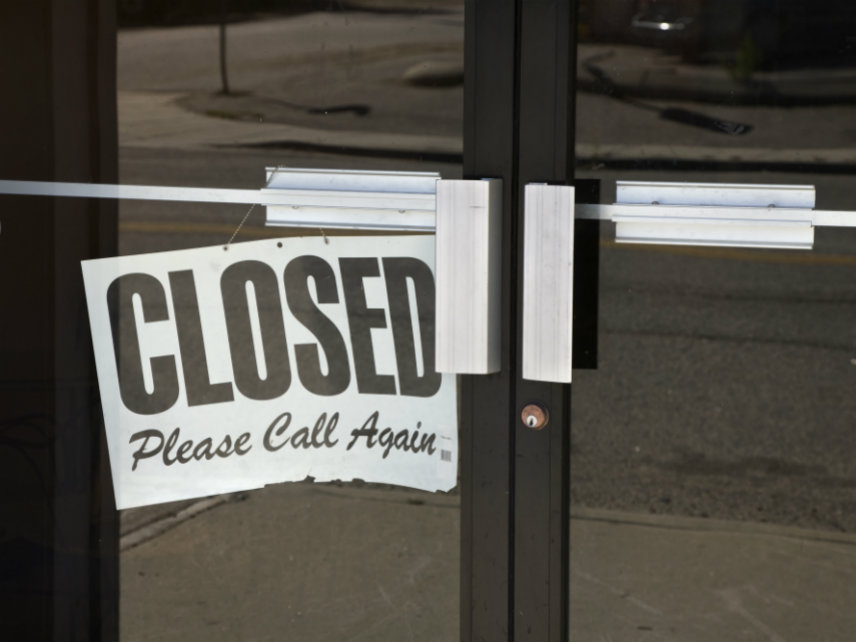Voters Could Have a Chance to Repeal North Dakota's Insane Blue Laws
Chairs, mirrors, shoes, clothing, and more can't be sold before noon on Sundays. But at least you can buy a beer at 11 a.m.

There are a dozen states that don't allow alcohol to be sold on Sunday. In 17 states, it's illegal to buy a car on Sunday.
Those are probably the best-known examples of so-called "Blue Laws," a legacy of the puritanical spirit and prohibitionist instincts that still color lawmaking in America today. They don't make much sense once you try to apply a little logic, but they are usually not much more than minor inconveniences.
Not so in North Dakota, where state lawmakers have taken blue laws to incomparable lengths.
It is illegal there, for example, to buy clothing or shoes before noon on Sundays. It's also illegal to buy pots or pans, silverware, and any other sort of kitchenware. It's illegal to buy curtains, draperies, blinds, and window shades. It's illegal to buy beds, mattresses, linens, sheets, and blankets. It's illegal to buy furniture, appliances, and luggage. It's illegal to buy mirrors, lawnmowers, lamps, and air conditioners.
It's technically legal on Sunday mornings to buy clothing for infants or for "transient travelers under emergency conditions," just like it's technically legal to buy hardware for "emergency plumbing, heating, cooling, or electrical repair," but good luck finding a store that's open before noon to sell it to you. Since almost anything that you'd buy in big box store, a mid-sized home goods store, or a small town hardware store is off-limits, most of them are closed until noon.
And if you want to count the minutes until they open, I hope you bought a clock or watch on Saturday. Buying any sort of timepiece is illegal too.
"North Dakota's current prohibition on Sunday morning shopping is arcane, unfair, and unenforceable," says Branden Medenwald, chairman of North Dakota Open on Sundays, a nonprofit working to end this state-enforced nonsense.
Medenwald is pushing to have a repeal of the state's blue laws on the ballot in 2018. His organization is in the process of collecting the 20,000 signatures necessary to make that happen.
"North Dakota doesn't dictate to farmers when to farm, hospitals when to practice medicine, or restaurants when to feed people. We are simply asking that all businesses, not just a chosen few, be allowed that same freedom," he wrote this week in an op-ed published at the Say Anything Blog, a website covering North Dakota politics.
Earlier this year, state lawmakers considered a bill that would have repealed all the state's blue laws except the all-day ban on car sales and the all-morning ban on alcohol sales. It failed to pass, but not before one state senator used the opportunity to condemn "selfish consumerism" while another argued it was unnecessary to repeal the blue laws because North Dakotans should "use that time to go to worship."
Aside from dealing a blow to the creepy notion that state lawmakers can tell people how to use their time, getting rid of the blue laws might have an actual, tangible benefit. Groups in favor of repeal—like the Greater North Dakota Association, the state's chamber of commerce—say getting rid of the bans would create jobs and benefit low-income workers.
North Dakota's blue laws also have become a vehicle for crony capitalism. Since 1967, the state has allowed some businesses to open early on Sundays, though it wasn't until 1991 that general retailers were allowed to open on Sunday afternoons. (Previously they were required to be closed all day.) There are now 39 exemptions written into the state law, covering everything from pharmacies to newsstands, and from restaurants to theaters.
By constantly expanding the exemptions, lawmakers have only added to the insanity.
For example, a 2015 amendment allowed for the sale of alcohol to begin at 11 a.m. on Sundays, specifically so bars could cater to football fans and brunch-goers. That means it's illegal to purchase a pair of shoes or a set of kitchen utensils on Sunday morning in North Dakota, but you can buy a round for all your friends at the local dive.
If that doesn't upend the puritanical logic behind blue laws, I don't know what does.
Meanwhile, if you want to buy a television set or a radio to watch or listen to the game, you are out of luck. The same is true if you want to buy an actual football: Sporting goods "other than those sold or rented on the premises where sports and recreational activities are conducted" are similarly banned from being sold.
"Repealing the Blue Law does not force businesses to open on Sunday mornings," Mendenwald points out on his group's Facebook page. "Repealing this law also does not force consumers to patronize these businesses on Sunday morning," he adds. What repeal does, he explains, is allow all "the freedom to choose how to spend their own time."


Show Comments (84)